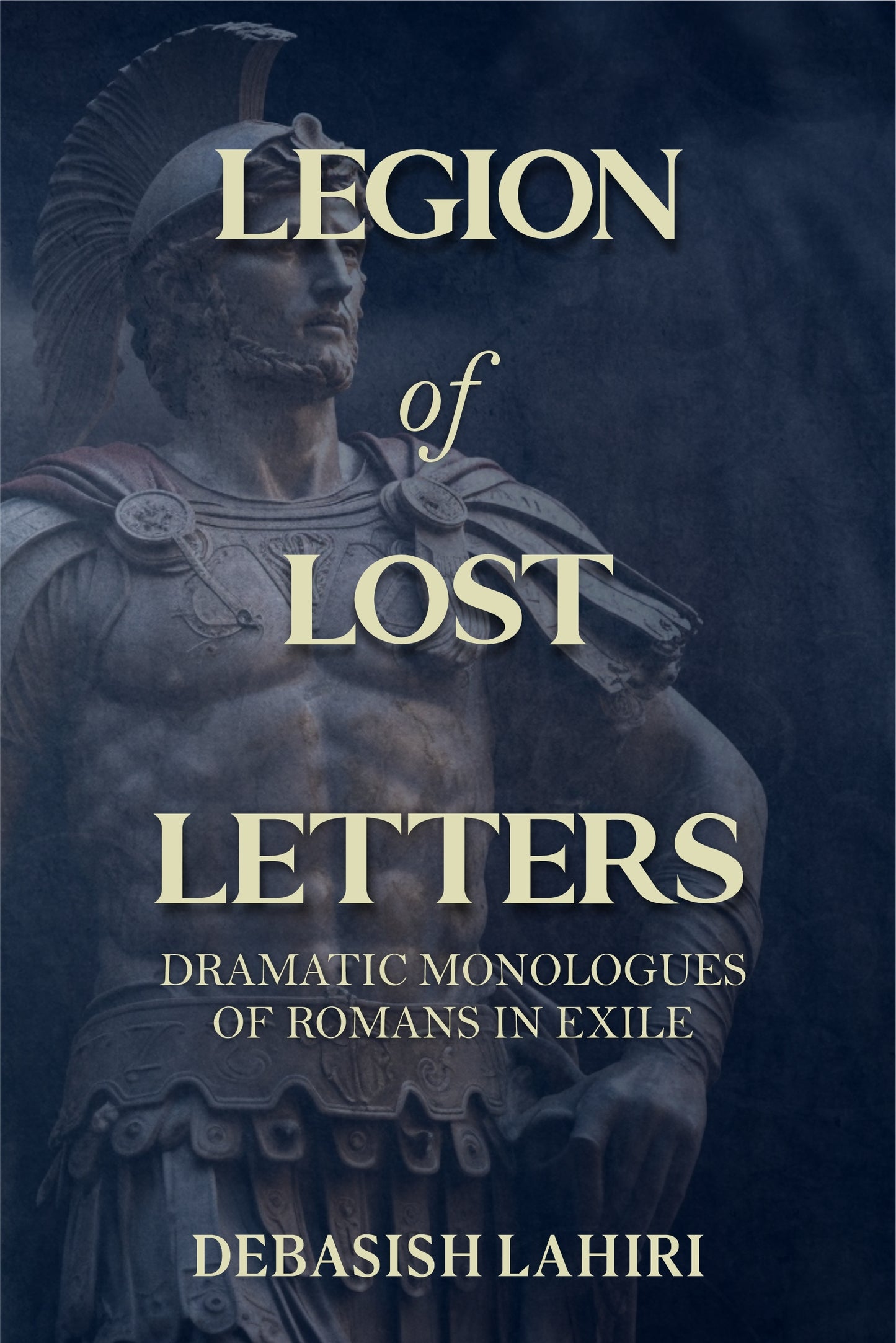Eyewear Publishing
Legion of Lost Letters
Legion of Lost Letters
Couldn't load pickup availability
Share
By Debasish Lahiri
Dramatic Monologues of Romans In Exile
Paperback
OUT NOW!
Moving through the puckered stone of Roman ruins in the present, poet Debasish Lahiri unearths rumpled vestments of the human heart buried there, making the ruins revenant. On the leeward side of heraldry and historical oversight women and men, lovers and misanthropes, unwilling gladiators and unlikely saints, doomed dreamers and gullible aesthetes thrive in the pages of Legion of Lost Letters. These forgotten beings from beyond the millennial horizon ponder the second millennium. The light of these lives, effigies of breathing, made pale and frail by time, resonates Legion of Lost Letters: a light that is not yet loud enough to be heard.
Debasish Lahiri is an internationally acclaimed poet. His poems have been widely published in journals like The Journal of the Poetry Society of India, The Poetry Salzburg Review and The French Literary Review among others. Lahiri is currently on the editorial board of Gitanjali & Beyond (Scottish Centre for Tagore Studies). He is a reviewer and regular contributor to the ‘Life & Letters’ column of The Statesman newspaper. Lahiri’s essay on the pandemic in Kolkata appeared in the L’Obs magazine on 27 th July 2021. Lahiri is the recipient of the Prix-du Merite, Naji Naaman Literary Prize 2019. He is an honorary member of Maison Naaman pour la Culture.

Debasish Lahiri’s fine dramatic monologues speak through ‘the mossy cleft’ in history, bringing the flavours of another moment – the taste of wine, the warmth of a Roman sun, orange-scented villas and bushes of columbine, the elegy of an exiled poet, a Christian saint’s martyrdom, the tragic end of a forbidden love affair on either side of Hadrian’s Wall – into the here and now. These poems offer us vignettes of a history that is intensely alive and present, reminding us that the Romans were not merely ‘here’ once; they are here still, for the poet who knows that chronological and geographical divides, fissures of
‘sea-passages and river-crossings, desert-trudges, royal caprices’, are no impediment at all to the imagination. – Arundhathi Subramaniam - Poet and Non-Fiction Writer
An imaginative feast unfolds in this journey through time and space as Debasish Lahiri recovers lost lives which are evoked with poetic finesse. Here are rare glimpses into ordinary lives in a telling that defies grand historical narratives. These poems offer much more than a tourist’s amble through Roman ruins in modern day Britain. The memory of the violence of slavery, captivity and unequal matches in amphitheaters are overcome by the images of love and freedom, of magic and beauty, carved with the fine chisel wielded by a master sculptor whose words ripple on the page with the promise that only unalloyed creativity brings. – Bashabi Fraser, CBE, Professor Emerita of English and Creative Writing Director, Scottish Centre of Tagore Studies (ScoTs) Edinburgh Napier University
Debasish’s visits to Roman sites in Britain, peopled as they are by the big boys of Roman history, has inspired stories of more lowly inhabitants – stories of soldiers, men, women and boys, whose lives, loves, deaths, dramas and conquests inhabit these pages with such power and assurance it is hard to believe they are creations of the poet’s imagination. The ‘lofty elephants’, Maruta and Pavana lumbering from a ship at Chester: old Rufinius, the sculptor choked by the dust of marble, crafting a mosaic of Cupid riding a dolphin; an illicit love between a Roman soldier and the daughter of a barbarian chief ending in murder and misery. This collection is not only a work of remarkable scholarship and research, it is also a masterpiece of story telling and imagination. A stunning achievement! - Chrys Salt, MBE, Poet and Artistic Director of Bakehouse
In a series of atmospheric evocations, Debasish Lahiri’s Legion of Lost Letters summons up the mysterious places of Roman Britain – Y-Gaer, Hadrian’s Wall, Caerleon – and the many varied characters who inhabited them. His accomplished, contemplative poetry conjures up a sensual world of the past, from the scent of “burnt September grass” in Ovid’s Black Sea garden of exile to the Northumberland mountains “armed today with wind”. With a deft eye for detail, Lahiri brings the often overlooked minutiae of Roman history to life, most notably the elephants who accompanied Claudius’s first invasion in “At Deva” or the mosaic Cupid of Fishbourne Palace and the Sphinx tombstone at Colchester. Above all, these engaging poems confirm how the present is still haunted by the distant past as the barrier between the two dissolves into the British mist. - Josephine Balmer Poet, Translator and Critic
Legion of Lost Letters is an extraordinary work of imagination that gives voice to a plethora of ordinary Romans whose lives have not been recorded in the history books. It is a lament for all exiles, washed up on unwelcoming shores, where the weather is inclement, the conditions rough and the end of life sure to be barbaric. For Lahiri’s poems here do not sing of emperors or generals – they tell of a foot-soldier; a slave; a soldier who falls in love with a Celtic girl; the wife of a Roman in exile in Colchester who falls under the spell of the statue of a Sphinx; a craftsman, maker of mosaics; an ‘old gossip’, watching an emperor arrive in Chester with a herd of elephants. Taking Ovid, in exile at Tomis, as his guide, Lahiri writes his ‘journal of the interim’, taking stock of what happens in the in-between of the recorded moments of history. The result is an astonishing, sensual insight into the lives of ordinary Romans in exile in Britain at a time when the world was out of joint, and death was a constant presence. Debasish Lahiri has the poetic craft and imagination to give voice to this chorus of lamenting voices that brings fresh, startling life to people and events usually found gathering dust in museums. Legion of Lost Letters bears witness to the power of the poetic imagination to resuscitate the past, and to the role of the poet as a seer and guide in a time of darkness. - Mary Noonan Academic, University College, Cork Poet and Critic


